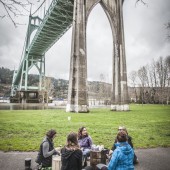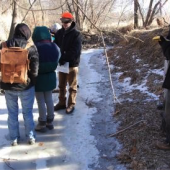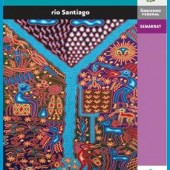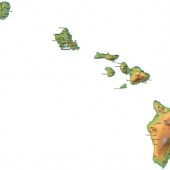
Upstream is an art project that builds connections and circulates stories among people who are linked to teach other through a common watershed. Experiences and memories about water are collected and shared through conversations over tea. Over time, these stories will help build common ground in communities where water can be a divisive issue.
Continue Reading
This case study describes a problem-based and service learning module in which undergraduate students participated in a community-based project. Students joined a group consisting of local non-governmental organizations (NGOs), public and private organizations, concerned citizens, and city officials to tackle issues concerning the local watershed. The case study took place over a number of years from 2014 to 2016 and will continue in subsequent academic years with a new group of multidisciplinary students.
Students put together documentation for a grant application that resulted in the city receiving $2.5 million dollars in grant money towards sustainable stormwater management systems. This aspect of the project included extensive data collection and analysis, much like the kind of work water conservationist in the field would perform. Students continued the work by using the data to plan and design appropriate, site-specific best management practices (BMPs) for the campus and in subsequent courses will implement these designs on site.
The mode of instruction described in this case study proved quite engaging to the students because it put them in the heart of an actual local project, doing work that was removed from a purely academic exercise – thereby offering a real-world scenario as field employees. The goal is to provide hands-on instruction that inspires and engages students and allows them to apply concepts of watershed management as a service to their local community.

Daily news relentlessly confirms that we have not been able to find a balance between the environment, the economy, society and culture. The trend of worldwide development is increasingly far from sustainability and it seems that we cannot perceive evident and subtle interconnections required to understand the whole picture. Thus, issues such as the loss of biological diversity, weakening of cultural diversity and poverty, have usually been dealt with separately. Nevertheless, they are in fact closely connected and relevant to sustainable development. A holistic and more comprehensive approach for action at all levels is required to attain sustainability, as pointed out by the United Nations Decade of Education for Sustainable Development (2005-2014). Water can be seen as one common thread to link those issues. On the other hand, Education must be at the core of sustainable development for either to be successful. Water education is therefore a core element to achieve sustainability. Watersheds are a natural starting point for a holistic, comprehensive approach, as they can be described as a physical-biological unit, as well as a socio-economic-political unit, which can be used for planning and management of natural resources. A watershed perspective facilitates education to be locally relevant and culturally appropriate. Herein we will discuss some examples of watershed-based education in Latin America, addressed to provide a better understanding of local environmental, social, cultural and economic topics and issues from early childhood.
Continue Reading
John Cusick reports on the compromises needed to bring place-based and hands-on sustainability curricula into at-risk schools where teachers and administers feel constrained by No Child Left Behind. The local Festival and Science Fair exhibits he describes help meet this challenge, for the theme of watershed education in Hawai‘i.
Continue Reading